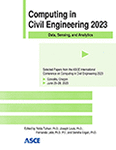Synthetic Image Generation for Training 2D Segmentation Models at Scale for Computer Vision Progress Monitoring in Construction
Publication: Computing in Civil Engineering 2023
ABSTRACT
Deep learning recognition models have been widely studied to recognize construction objects from site images. These methods require high volumes of quality data from human-made annotations to achieve moderate performance. Yet, manual annotation of images is time-consuming and error-prone, limiting ground-truth quality and performance of the resulting recognition models. To address such inefficiencies, automatic data generation and labeling of synthetic images have been recently explored. The quality of this type of data and how it can be effectively incorporated into a machine learning training pipeline still deserved further evaluation such that these models can scale up to real-world applications such as computer vision-based construction progress monitoring. This paper aims to re-evaluate synthetic image generation using physics-based simulation environments and 3D BIM. Using experimental results, insights are shared on how the quality of synthetic data can impact the performance of the trained recognition models where synthetic images with repetitive architectural or MEP patterns or 4D BIM with low-LOD engineering disciplines are used and when real and synthetic images are integrated into the same training pipeline. A path forward for improving the performance of the synthetic data and specifically mitigating the impacts of low LODs in BIM engineering discipline are discussed.
Get full access to this article
View all available purchase options and get full access to this chapter.
REFERENCES
Atapattu, C., and Rekabdar, B. (2019). “Improving the realism of synthetic images through a combination of adversarial and perceptual losses.” 2019 International Joint Con on Neural Networks (IJCNN), 1–7.
Barth, R., Hemming, J., and Van Henten, E. (2020). “Optimising realism of synthetic images using cycle generative adversarial networks for improved part segmentation.” Computers and Electronics in Agriculture, 173, 105378.
Bi, S., Sunkavalli, K., Perazzi, F., Shechtman, E., Kim, V., and Ramamoorthi, R. (2020). “Deep cg2real: Synthetic-to-real translation via image disentanglement, <https://arxiv.org/abs/2003.12649>.
Han, K., Degol, J., and Golparvar-Fard, M. (2018). “Geometry- and appearance-based reasoning of construction progress monitoring.” Journal of Construction Eng and Management, 144(2), 04017110.
Hong, Y., Park, S., and Kim, H. (2020). “Synthetic data generation for indoor scene understanding using BIM.” Proceedings of the 37th ISARC 334–338 (October).
Liu, Z., Lin, Y., Cao, Y., Hu, H., Wei, Y., Zhang, Z., Lin, S., and Guo, B. (2021). “Swin transformer: Hierarchical vision transformer using shifted windows, <https://arxiv.org/abs/2103.14030>.
Núñez-Morales, J., Hsu, S., Ibrahim, A., and Golparvar-Fard, M. (2023a). “New Metrics to Benchmark and Improve BIM Visibility within a Synthetic Image Generation Process for Computer Vision Progress Tracking.” CSCE/CRC International Construction Specialty Conference, Moncton, New Brunswick, Canada.
Richter, S. R., AlHaija, H. A., and Koltun, V. (2021). “Enhancing photorealism enhancement, <https://arxiv.org/abs/2105.04619>.
Roberts, M., Ramapuram, J., Ranjan, A., Kumar, A., Bautista, M. A., Paczan, N., Webb, R., and Susskind, J. M. (2020). “Hypersim: A photorealistic synthetic dataset for holistic indoor scene understanding, <https://arxiv.org/abs/2011.02523>.
Wang, J., et al. (2020). “Deep high-resolution representation learning for visual recognition.” IEEE Transactions on Pattern Analysis and Machine Intelligence, 43(10), 3349–3364.
Wei, Y., and Akinci, B. (2021). Synthetic Image Data Generation for Semantic Understanding in Everchanging Scenes Using BIM and Unreal Engine. 934–941.
Zhang, R., Isola, P., Efros, A. A., Shechtman, E., and Wang, O. (2018). “The unreasonable effectiveness of deep features as a perceptual metric, <https://arxiv.org/abs/1801.03924>.
Zhu, J.-Y., Park, T., Isola, P., and Efros, A. A. (2017). “Unpaired image-to-image translation using cycle-consistent adversarial networks, <https://arxiv.org/abs/1703.10593>.
Information & Authors
Information
Published In
History
Published online: Jan 25, 2024
ASCE Technical Topics:
- Computer models
- Computer vision and image processing
- Computing in civil engineering
- Construction engineering
- Construction management
- Construction sites
- Education
- Engineering fundamentals
- Errors (statistics)
- Mathematics
- Methodology (by type)
- Models (by type)
- Practice and Profession
- Scale models
- Statistics
- Training
- Two-dimensional models
Authors
Metrics & Citations
Metrics
Citations
Download citation
If you have the appropriate software installed, you can download article citation data to the citation manager of your choice. Simply select your manager software from the list below and click Download.
